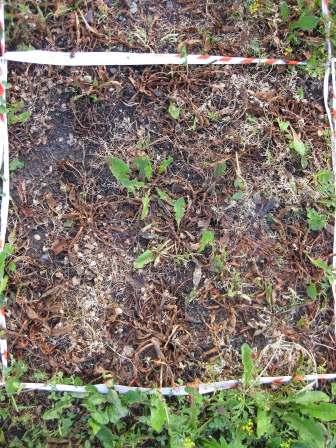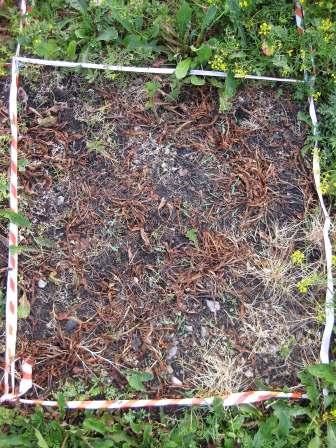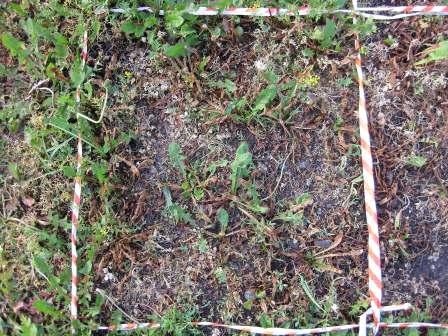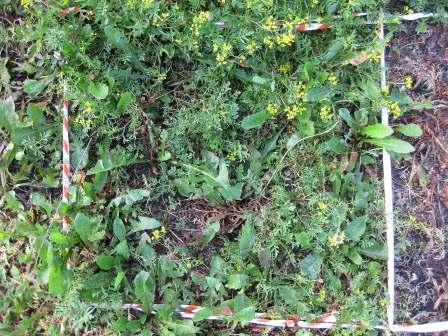I performed a little demonstration the last few weeks which I thought you might be interested in seeing. So here it is:
I took a little weedy spot of land out in the nursery and divided it into four sections. Three weeks ago I applied Round-up to one of the sections and vinegar to another. Then, a few days ago, I applied vinegar (again) to the third section and Round-up (again) to the fourth. Then yesterday I took pictures of all four sections. I conducted this little experiment so that I could demonstrate to a group what happens over time after you apply these chemicals. The results are below.

Above is the Round-up treatment a week or so after application.

And here’s the Round-up after three weeks.

The Vinegar after a few days.

And the vinegar after three weeks.
Vinegar is great for little weeds, but boy oh boy, once they grow up, vinegar just doesn’t do it.
So we know roundup can kill a patch of plants with one application and vinegar can’t. Can we try e experiment again now and apply the vinegar multiple times? I don’t know if it would help, but I see an analogy to medicine: sometimes two meds are designed for the same purpose, but one must be taken every four hours while e other only needs to be taken once a day.
I think that’s a fair question — I would expect vinegar to work after multiple applications, but how many? I will try a test later this summer.
Another issue to consider is what the two products do to the soil and the critters that live there. Killing weeds is one thing, but if the soil won’t support desirable plant growth after treatment, it seems to be a bad thing, except maybe in gravel driveways!
I’m interested to see how long it would take for the Round Up – treated patch to reestablish itself. From my experience- it takes over half a year, and I feel this is because the Round up stays active in the soil for this period of time!
I just stumbled into thus site. I wish to respond. I am a farmer with years of experience. Roundup is inactivated as soon as it hits soil. In fact we struggle to control weeds behind wheels of the sprayer because of the dust they stir up.
Roundup enters through the plant leaves and travels through the plant to do an effective kill. Vinegar is mostly is mostly topical. Roundup is actually very safe compared to most herbicides we use.
Thank you for your information. Coming from a farmer, I find your answer very important to my question.
Without south of the border stoop labor, the organic food industry probably wouldn’t be viable.
In my own small tree nursery and extensive personal vegetable garden I use a combination of wood mulch newspaper and landscape fabric in addition to a string weeder, but there is still plenty of hand weeding to do. My resistance to the use of herbicides is mostly irrational emotion. Seems like a cruel way to kill a plant and in spite rumblings from my rational brain, I worry about the affects of residue.
I do use Roundup occationally – for instance, I apply it to stems or stumps of shrubs and small trees I’ve cut to the ground. But I always feel guilty, though what I’ve read is that there is little harm to the environment unless it is used near water. So what’s the story, Garden Professors? Is Roundup harmful to the environment?
PS, I’ve planted stuff in areas where I’ve applied Roundup and haven’t noticed an impact on the new plants.
Let me start with Tom’s question. How long does it take for an area hit with Round-up to recover. Not long. After application the Roundup becomes bound to soil particles very quickly making it inactive. In fact, if you were to plant seeds a few days later those seeds would germinate just fine. I’ve been using Round-up in our fields for years and generally, after a few rains, new weeds germinate and we end up needing to spray again. In short — The weeds come back when there are seeds and water. Do be aware that there are Round-up formulations that do include preemergent herbicides that will keep plants controlled for six months or even longer. Now on to Jason’s question. How bad is Round-up for the environment? That is not an easy question to answer. If you use Round-up properly and infrequently there’s no reason to believe that it will do much besides killing the weeds you target, but if you apply it willy-nilly and get it into ponds or streams it could very well hurt aquatic life. Obviously if you don’t do a good job of keeping it away from plants you don’t want to kill you will kill some things you don’t want to. Keep in mind, though, my post on the frog I killed with vinegar! All pesticides have their dangerous sides.
What the concentration of vinegar? Also, you should call it acetic acid.
The concentration of acetic acid in the vinegar which I used in the above pi
19e0
ctures was about 5%. If I’m using a household product then I believe it is more appropriate for me to use the term “vinegar” to indicate that fact — that said, you’re right, I should have pointed out the acetic acid concentration in the original post.
What, if anything, does the vinegar do to the soil and the life in it? Will multiple applications cause problems?
Sandy, I don’t know exactly what the acetic acid would do to the soil, but I would expect that it would be quite toxic to many soil microbes in the short term, but that the soil would recover quickly.
Dont know about 5% acetic acid, but a turf agronomist told me that lab strength acetic acid (maybe 30%?) would lower soil pH and effectively sterilize soil. Microbes and other living critters could not survive in such an acid environment. The question would next be how long would it take the soil microscopic life to rebound.
The more I learn, the more fond I am of cardboard.
I was told that acetic acid is neutralized as it breaks down and doesn’t have a long term affect of acidification of soil. Was the teller mistaken? He used sulfuric acid to lower pH of highly alkaline water going into his commercial blueberry crop which is the most proscribed method when sulfur applied directly to the soil is inadequate.
Fred, opt for the chunkier mulch – like wood chips – instead of cardboard. Okay, I know I sound like a broken record, but Roundup doesn’t hold a candle to a thick layer of wood chips for weed control and plant establishment over several years (published research). Cardboard and other sheet mulches will control weeds somewhat, but they also reduce water and oxygen movement into the soil. No point on killing off everything else in the soil while wiping out the weeds…
Having tried regular vinegar to change pH in a container mix I can say that a single application won’t have much effect. I would expect that it would take multiple applications over a long time to have any significant lasting effect on pH. Naturally the higher the concentration of acetic acid he more effective. Having said that, though, there is no doubt that acetic acid is a sterilant and would kill any microbes it encountered before it was neutralized.
I buy glacial acetic acid and dilute it to 20%. This works very effectively in spring and late winter when weeds are just sprouting and it’s too cold to use Roundup (60 degrees minimum temp is what is recommended for Roundup.)
now go do the test again with 20% vinegar and update this thread (don’t use the vinegar that you add to your fish and chips)
you can buy it here:
http://www.amazon.com/EE-NW004-20-Vinegar-Gallon/dp/B0031AY1LA
then after the test come back and update your thread
Herb and Dimitri, As I’ve posted before, I have used 20% acetic acid. I killed a frog with it accidentally. In terms of the weeds, though it had a faster burndown than the normal vinegar (5% acetic acid), the weeds came back just as rapidly.
For those who have not been following this blog for a while (or who have forgotten Jeff’s post from last year), here’s the link: http://gardenprofessors.com/vinegar-a-garden-miracle/
Hi Linda,
I can’t get the link to open. Is it available in PDF format?
Sorry, Sonia, it was from a previous platform. I’ve updated the link but it’s here as well: http://gardenprofessors.com/vinegar-a-garden-miracle/
Good ol’ Monsanto. They can kill anything for years. There are areas of Vietnam where the vegetation has never recovered even after these decades since. One has to wonder what goes through the mind of a scientist when your bosses demand such dastardly results. The old Nuremburg Defense always seems to be the standard fall back.
Does acetic acid lock up calcium in a stable bond or not?
An answer would be much appreciated.
Alan, I think what you’re getting at is whether acetic acid would make calcium unavailable to the plant — the answer is no, it shouldn’t. Acetic acid reacted with a calcium compound such as calcium carbonate would make a salt, such as calcium acetate, which would be water soluble.
Just FYI,
20% acetic acid is quite dangerous. I recommend you wear a vapour mask, eye protection and a protective suit.
@Jeff,
You should call it acetic acid because vinegar is an ambiguous term:
White vinegar
Balsamic vinegar
Red wine vinegar
etc…
Also, the insinuation is that using a product such as vinegar that is a common household item requires no safety handling on the part of the user, nor requires careful application to prevent harm to desirable plants – heck, it’s “natural”, right???
Hmmm, I like the argument, but it doesn’t inspire me to use the term acetic acid (which, after all, could mean white vinegar, balsamic vinegar — or even diluted glacial acetic acid). Instead it inspires me to be more careful in stipulating what type of vinegar I used. In terms of safety — anyone using anything as a pesticide needs to be careful — I don’t see referring to something by it’s commercial name as in any way implying that thing is safe. You don’t squirt vinegar in your eyes when you cook — so you shouldn’t when you kill weeds with it either.
One thing I learned about vinegar, while using different acids for dye fixing – vinegar evaporates, and once it does, it’s gone. That’s why we smell it so strongly – it is vaporizing into the air at a high rate. It’s the same reason that it doesn’t last, in terms of changing pH in the soil, or other applications.
Interesting. Since I’m trying to be stay with organic methods, I opt for the vinegar for weed control in sidewalk/driveway cracks over a Roundup type product. But I will also chime in that I’ve had great success with mulch, nice thick layers of mulch do wonders for fruiting trees and shrubs and to prepare an area for planting.
Thanks great advice..planting a garden soon n I wantd 2 know how 2 kill the weeds b4 I turn over the soil n get it nice n ready 4 veggies. But after I spray how long after can I plant seeds again?
Hi Nia,
If you’re using Round-up, or any glyphosate product, wait about a week just to be safe. For vinegar next day is fine.
Once Roundup in on the soil surface it is deactivated by soil organisms. There is NO residual with Roundup.
I was told that acetic acid is neutralized as it breaks down and doesn’t have a long term affect of acidification of soil. Was the teller mistaken? He used sulfuric acid to lower pH of highly alkaline water going into his commercial blueberry crop which is the most proscribed method when sulfur applied directly to the soil is inadequate.
That’s true, you can’t expect acetic acid to have a strong or long lasting effect on soil pH.
Lately, I’ve found that it’s not only important to compare stuff like shown here in the photos and topic, but also to learn about what’s involved making products.
Vinegar for weeds in the landscape has me very interested to research something very related. That is how many effects or resources are involved to make vinegar. And how does that relate to the big picture of going organic.
For example, I found out that for lasagna gardening, the use of cardboard or paper which means it is not recycled, triggers pollution, cutting of trees and use of oil that few people every think of. Depending on their local services.
So with vinegar, no doubt it’s very organic. But I’ve never given a though to what the total needs are to manufacture, distribute and deliver it. That part would be more environmental or community related though, and not so much limited just to the garden.
This seems important when it comes to really comparing Round-Up to Vinegar, or other.
Hi, I used the Vinegar (WHITE) on my alkaline soil in an experiment, as I am going green and for all of my gardening years have never used pesticides or harmful remedies. For my test, I got a cup of dirt, and used a full strength without dilution, a good douse of vinegar, (Sorry did not measure as this was a test mainly for the proof that it would lower PH and for how long it would keep the PH lowered. I then allowed the dirt to bake in the sun awhile) The results you ask? My soil was lowered immediately from 8.0 to 5.5. That was pretty drastic of a change, and would normally shock plant life, even the acid lovers. I have planted a strawberry as a test in this, to see if it will grow, and so far it has stayed alive). I too am concerned however, because I am not a chemistry scientist, as to the effects of the living organism in soil. I have read whats available on GOOGLE university, and the jury is out, most saying it will not allow life to survive. But why that doesn’t make sense to me is because of the Sulphur treatments that are used. I dont know. If someone can help with giving me the differences in these two substances, I would think that vinegar would be the better option to lower it immediately, and then sustain it with organic compost and dirt.
Hi Lisa,
I have worked a good bit with vinegar and do not find that it works very well on soils. While I’m certain that it changed the pH of your cupful of soil, I do not think it will have much of a lasting effect on a garden bed. Sulfur, applied as recommended, lasts for a couple of years. When I have tried vinegar mixes in potted plants I have found that effects last for a couple of days at best.
Why would vinegar be considered “organic”? It’s a chemical like any other. White vinegar is usually made from distilled alcohol, but sometimes from petroleum products.
Okay I’ve always used roundup for 15yrs or so and it works really good.What if u use the vinegar first application.Then use the roundup or can you use both at same time or will the vinegar have an effect on the roundup?Heck some weeds are getting resisted to roundup.
The vinegar would damage the leaves so that Roundup would not be translocated well. And pesticides should never be mixed – there’s no way of knowing what would happen with the mixture. Look what happens when you mix Coca-cola and Mentos! https://www.youtube.com/watch?v=iS2vG1o7Op4
Our strata is trying to go green. We’ve been mulching our beds, pleased with the results. We are losing ground with weeds in long gravel driveway, parking areas and 1’-area following base of walls. We used to use Casoron with good results. Corn gluten is bulky and expensive (I’ve read Linda’s article on its questionable success for use in wet climates – thank you for that article Linda).
Any ideas on affordable ‘green’ products combined with reasonable labor involvement for eliminating weeds in gravel/pebbles/stony parts of large landscapes? Can’t really apply scolarisation techniques as vehicles must drive on it and it is a long driveway (over 500’ x 16-20’)
(Note: Dogs, people, children walk on the driveway barefooted but areas around buildings are not frequented by us and our pets)
I look forward to hearing back or being directed to other reliable sources – I’m overwhelmed by what’s on the web, too much to sort through to know what is valid, what is not!
Thanks
You might want to ask this question on our Facebook group, where over 22,000 members can help give you informed feedback: https://www.facebook.com/groups/GardenProfessors/